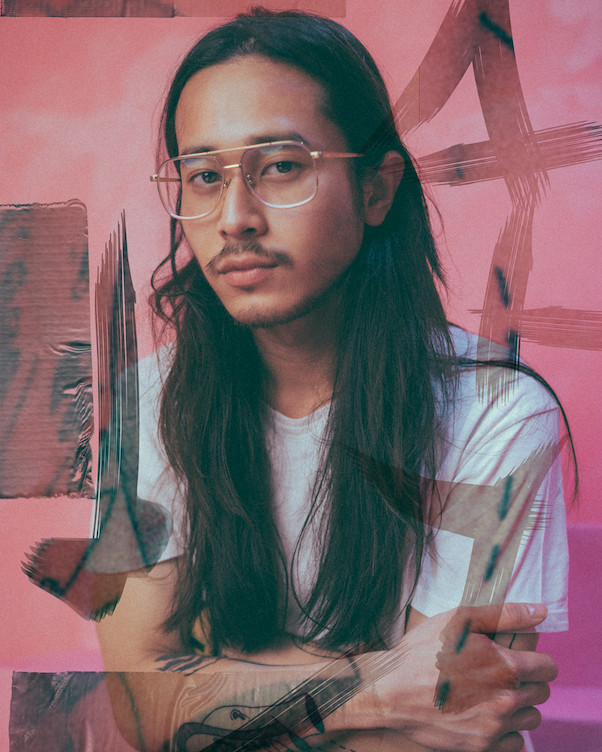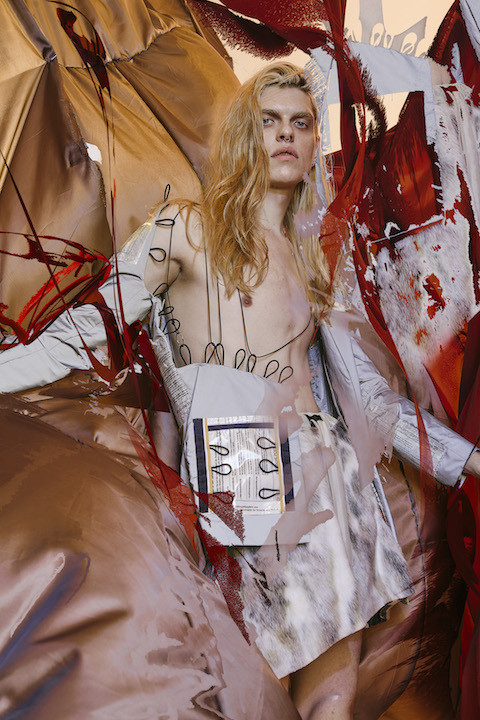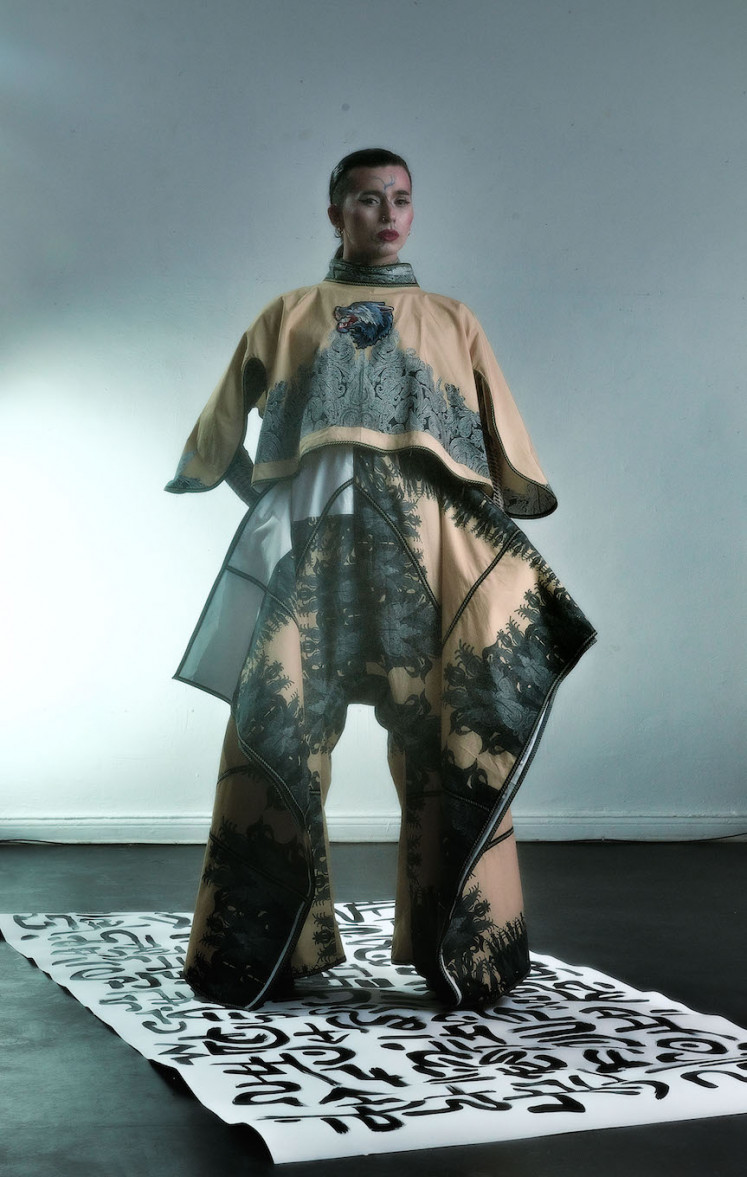Popular Reads
Top Results
Can't find what you're looking for?
View all search resultsPopular Reads
Top Results
Can't find what you're looking for?
View all search resultsDon Aretino imbues fashion creations with narrative identity
The Berlin-based fashion designer explores self-identity, religion and gender politics in his collections, which have caught the eye of celebrities like Jared Leto and Agnes Mo.
Change text size
Gift Premium Articles
to Anyone
B
orn and raised in the outskirts of Medan, North Sumatra, Don Aretino grew up in a multireligious household that included a Muslim father, a mualaf (Muslim convert) mother, a Catholic aunt and a Buddhist grandmother.
“We all lived under the same roof and I learned a lot about different religions,” recalls Don, who adds that he and his siblings attended an Islamic school.
“Since I was a child, I noticed something different inside me wanting to get out, but I didn’t really know what it was until puberty, when I started to become aware of my attraction to [my own] sex,” he says.
It was a difficult time for Don, who was plagued by self-hate. The religious environment around him wasn’t very tolerant, particularly of gay people.
“Every time I prayed, I cried and asked Allah to make me ‘normal’,” says Don.
“But with the arrival of the internet and chat rooms, I finally learned what it means to be queer or homosexual. That’s when I decided that I need to get out of my hometown and even the country in order to find myself and become who I really am.”
Wanting to escape the norms and paradigms that had dictated his life since childhood, Don’s plan to go abroad materialized when he was just 17.
“I searched for scholarships in Japan and the Netherlands, but wasn’t successful,” he says. “I had an agreement with my dad. He told me that if I wanted to study abroad, he’d only finance my first year and I’d have to figure out the rest on my own.”
Continuing with his search, Don found out that Berlin offered tuition-free programs and applied for a visa, which took around a month. Two days after he collected his visa-stamped passport, he was on a plane to Germany.
A model wears one of Don Aretino’s pieces. (JP/Tomás Eyzaguirre)His planned to study fine art or animation, but again, this wasn’t meant to be.
“I was literally rejected 21 times,” he says with a laugh.
“But when I applied for fashion design at HTW Berlin, I got in immediately,” says Don, referring to the University of Applied Sciences, a renowned public institute.
“I saw it as a sign that [fashion] was what I’m supposed to be doing, and I was always interested in fashion, even as a kid. I remember being fascinated, looking at the fashion magazines my mom subscribed to,” he says.
Don quickly developed a knack for expressing himself, his thoughts and his beliefs through his creations, which helped him find his place in the world and figure out who he was.
“I had a professor named Anke Schlöder who helped me dig deep within myself and push my creative value through different tasks and exercises,” he explains, adding that his personal identity and experiences have always informed the narrative behind his designs.
Don’s “Halal” collection, for instance, focuses on a unique interpretation of what it means to be homosexual in Islam.
“The Quran is written in such a poetic way that its meaning should be interpreted through different perspectives,” Don explains.
“I convey this in the collection through the digital print that I created using pages of the Quran, Arabic writings, [definitions] from the Oxford Dictionary and drawings of same-sex sexual intercourse.”
He also explored the concepts of “halal” and “haram” in the context of the male body, cutting out silhouettes of different parts of the body.
It is considered haram in Islam for men to show their bodies from the belly button to the knees, so this area must always be covered. Only mahram, a blood relative with whom marriage is prohibited, can view this area of the male body.
“I also added [embroidered] halal stamps to ‘legitimize’ these garments, [showing] that homosexuality is something that should be accepted in Islam,” says Don.
Don has worked for several notable brands throughout his career, including Berlin-based Sadak as well as House of Malakai, while creating his own collections and gaining additional experience as a costume and set designer. His designs have been featured in several international fashion magazines.
One of the most surprising, if not shocking, moments in his career came when the stylist of American actor and musician Jared Leto contacted Don out of the blue.
“They had seen an article about me in Dazed Magazine and asked for six garments from my ‘Halal’ collection,” Don says. “I’ve been a big fan of Jared Leto for quite a while. In the end, he wore one of my jackets at a concert.”
Dian Sastrowardoyo, Agnes Mo and Richard Kyle are also among the celebrities that have discovered Don’s designs. He says he greatly appreciates their support, which has helped him grow his reputation.
While the pandemic has slowed down business, it has also given Don an opportunity to hone his skills in other fields. He is currently taking a stab at 3D fashion and graphic design, and is learning how to make pleated fabrics at home.
Don has other dreams and plans for the future, including setting up an online shop for selling one-off pieces created from remnant and scrap fabrics and secondhand clothing. He is also keen to produce short films, work in other countries like Japan and South Korea, hold an exhibition of his work and establish a charity foundation in Indonesia with a focus on LGBTQIA rights and awareness as well as art education.
Moving back to Indonesia is something Don is contemplating, but he is the first to admit that this would be a big step and he doesn’t really know where to start.
“I don’t have a proper investor yet that could support my brand financially, and my network as a fashion designer is not yet strong enough in Indonesia. Other than that, until now, I feel like Indonesia isn’t yet ready to fully accept my way of storytelling through my works, as homosexuality is still seen as taboo,” he says.
Celebrities such as Dian Sastrowardoyo, Agnes Mo and Richard Kyle have discovered Don Aretino’s designs. (Courtesy of Don Aretino/Tomás Eyzaguirre)Don adds that his homosexuality initially put a strain on his relationships with family and friends. He first came out to his sister, which ended in an argument. The next person he told was his mother.
“She took it quite well, as most mothers would,” he says. “My dad sort of stopped talking to me for more than half a year. He found out by googling my name and reading some of the articles that had been written about me.”
Don feels that his family blames his environment and the surrounding gay community in Europe for his sexual orientation.
“But I don’t really blame [my family] for the way they react or think, because in the end, they don’t really know any better,” he says. “They have lived their whole lives in Indonesia, where most of the media is heavily filtered.”
None of his family members has visited Don in Berlin. Sadly, his mother passed away earlier this month before she had the chance to do so.
“I would have loved for my mom to see where I have been living all this time and to meet all my friends in Berlin,” says Don.
He also stresses that enough time has gone by for his family to come to terms with his sexuality: “They are slowly beginning to understand.”
For Don, home is a place where he can surround himself with the people he loves.
“It doesn’t matter where I am, as long as I can always just be myself.”












